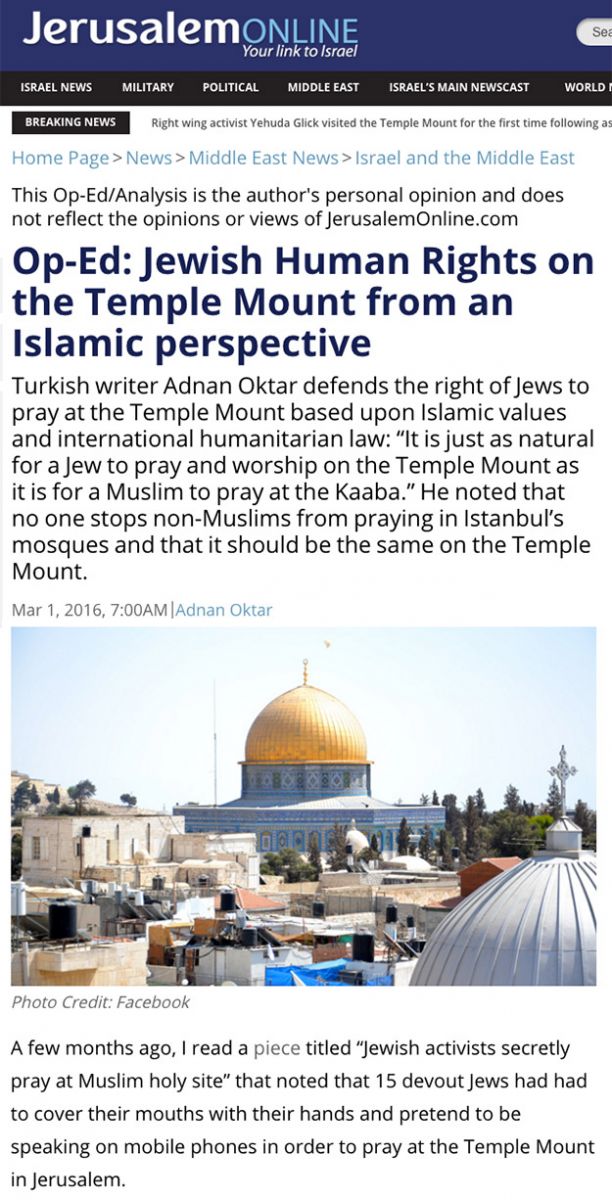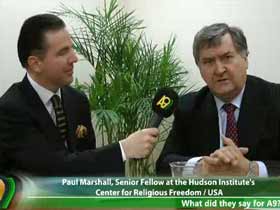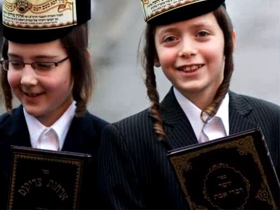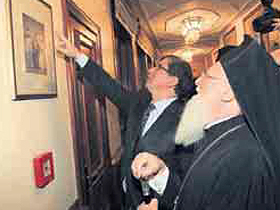Bigotry: The Dark Danger
Jewish Human Rights on the Temple Mount from an Islamic perspective

A few months ago, I read a piece1 titled “Jewish activists secretly pray at Muslim holy site” that noted that 15 devout Jews had had to cover their mouths with their hands and pretend to be speaking on mobile phones in order to pray at the Temple Mount in Jerusalem.
I had many times listened to the troubles inflicted on devout Jews wishing to pray at the Temple Mount, which was described by Rabbi Yehuda Glick. Rabbi Glick, who was a guest of honor at an iftar meal we arranged in Istanbul last year, described these matters in detail both in our private meetings and in broadcasts on A9 TV.
It is a flagrant violation of human rights to seek to prevent someone praying in a place that he regards as “sacred.” Article 18 of the Universal Declaration of Human Rights states that everyone has the right to freedom of belief, opinion and religion, and that this freedom includes the right to pray, either alone or with others. It is just as natural for a Jew to pray and worship on the Temple Mount as it is for a Muslim to pray at the Kaaba.
Freedom of belief and worship is also one of the loftiest norms in Israeli law. For example, the 1948 Declaration of Independence states that freedom of belief is guaranteed in the State of Israel, and that religious speech and behavior are included within that freedom. Indeed, Article 171 of the Israeli Penal Code regards obstructing people who come together to pray as a crime.
The allegation that “Muslims are offended by non-Muslims worshiping on the Temple Mount,”2 the supposed justification for the restriction on Jews’ right to pray there, has no Qur’anic basis. Because the verses of the Qur’an say nothing about being offended by Jews worshiping. On the contrary, many verses of the Qur’an contain expressions praising the acts of worship of the People of the Book (Jews and Christians).
For example, the Qur’an says; “They are not all the same. There is a community among the People of the Book who are upright. They recite God’s signs throughout the night and they prostrate. They believe in God and the Last Day, and enjoin the right and forbid the wrong, and compete in doing good. They are among the righteous. You will not be denied the reward for any good thing you do. God knows those who fear [and respect God].”(Qur’an, 3: 113-114)
Indeed, some tourists visiting mosques in Istanbul are so affected by the spiritual atmosphere that they pray in them according to their own beliefs and nobody tries to stop them.
In addition, the Holy Land is a place where Jews, Muslims and Christians should live together in peace, freely worshiping as brothers. The Qur’an explicitly states that the Jews have the right to live in the Holy Land. This is made explicit in verses 5:20, 17:104, 10:93 and 2:58. Therefore, for a Muslim, seeing Jews in those lands and witnessing them worshiping is a source of joy.
Additionally, it is not only Muslims who would deny Jews the right to pray on the Temple Mount, but also the Israeli people and official bodies. There are three main reasons for this reluctance:
There are strict laws to abide by when visiting certain sections of the Temple Mount, the holiest site in Judaism. However, it is not possible to abide by all of them under today’s conditions. On the other hand, there is a special section where high priests used to communicate with God in the First and Second Temples. Only the priests of the time were permitted in this section, which is completely closed to visitors. Furthermore it’s not even known for certain where this section is; rabbis are at variance with each other on this matter. More liberal rabbis such as Yehuda Glick maintain that it’s possible to know which areas on the Temple Mount are permitted and that therefore it should not be forbidden for Jews to pray at the Mount. Rabbi Glick says that3 there are at least 300 rabbis who think alike.
Yet the Jewish law prohibits Jews from entering there until the third Temple is built. A few hours after Israel seized control of the Temple Mount in 1967, Chief Rabbis Isser Yehuda Unterman and Yitzhak Nissim declared a religious ban on Jews entering it. The Chief Rabbinate Council ratified this. It was again confirmed by another declaration published in 2005.
The second reason is that the legal status of the Temple Mount forbids entry to non-Muslims. The formula signed by the Ottoman Sultan Osman III in 1757 setting out how the sacred sites in Jerusalem were to be shared among the faiths is still recognized by the State of Israel today. This model, known as the “Ottoman status quo,” was maintained as it was by the 1856 Treaty of Paris, the 1878 Treaty of Berlin, the 1923-1948 British Mandate, the 1948-1967 Jordanian administration and the State of Israel. It was once again confirmed under the 1994 Israeli-Jordanian Peace Treaty. Therefore, international agreements to which Israel is a signatory and its 250-year legal status prevent Jews from praying and worshiping there.
The third reason is the State of Israel’s security concerns. It is true that some Muslims react very strongly against Jews praying on the Temple Mount. For these reasons, Prime Minister Netanyahu has many times emphasized that he will not change the traditional status and the Israeli Supreme Court has also rejected all applications to allow Jews to pray on the Temple Mount on the grounds of ‘public order.’
It needs to be made clear that the protests by some Muslims against Jews worshiping there are in no way compatible with the spirit of peace in the Qur’an and Islam. The framework of belief of some Muslims influenced by bigoted ideas causes such non-Qur’anic protests to occur. The only solution to this problem is education through the Qur’an.
The way out of this impasse is love and reconciliation and the construction of the Third Temple on some empty land on the Temple Mount without damaging the existing Islamic sites there. As I have said many times, the Temple of Solomon can be rebuilt, exactly as described in the Torah, on empty land on the northern end of the Temple Mount. We can open this glorious place of worship with the participation of senior level members of all three Abrahamic faiths to the sounds of bells, trumpets and the call to prayer, and can thus make Jerusalem a ‘City of Peace’ in line with the Hebrew meaning of the name.
Both human rights and Islam require that the Jews be able to pray freely on the Temple Mount in a place of worship to be built on a suitable piece of land there. The establishment of peace and love between Muslims and the People of the Book will be the primary means by which this can be accomplished.
1- www.usatoday.com/story/news/world/2015/11/15/jerusalem-temple-mount-noble-sanctuary-activists-prayer/75040788/
2- www.jerusalemonline.com/Shmuel%20Berkowitz,%20The%20Temple%20Mount%20and%20The%20Western%20Wall%20in%20Israeli%20Law,%20p.34,%20Jerusalem,%202001
3- www.youtube.com/watch?v=iPOb4G1aGbg
Adnan Oktar's piece in Jerusalem Online:
2016-03-01 14:46:11






